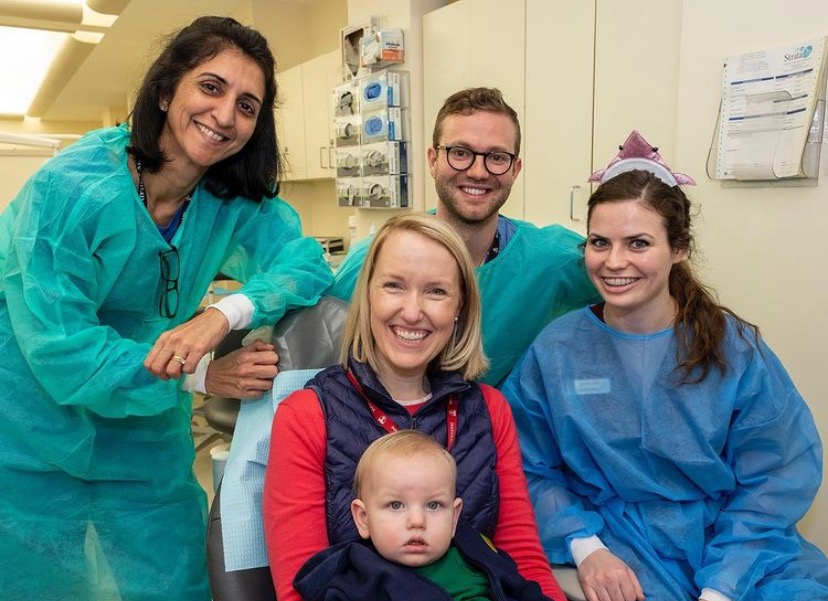By Vivian Ha, HSDM’24
“There is not a stark contrast between faculty, staff, and students… which helped me feel more empowered to influence decisions that pertain to students at HSDM.”
I know what you must be thinking.
“Carrie Sylven? THE Carrie Sylven, the Director of Student Affairs at the Harvard School of Dental Medicine? We know her and we love her! But we would love to know more about her!”
Lucky for you, loyal reader, the Harvard ASDA Social Media Committee received the wonderful opportunity to interview Carrie in early December 2020.
Carrie, growing up outside of Philadelphia, sees her academic journey taking her from undergraduate adventures at Bates College in Maine to a core experience earning her Masters in Education at Boston University. At Bates College, Carrie studied Environmental Science, working in environmental education for two years after her graduation.
“Wait a minute… Maine is not Massachusetts!” You’re absolutely right, dear reader! Carrie’s family and friends were located in New York City and Philadelphia– to be closer to her loved ones, Carrie felt the move to Boston was logical, manageable, and comfortable. It made sense. Once in Boston, she worked at Tufts University School of Dental Medicine in Admissions for 2 years before moving to a role in Student Affairs for the remainder of her 10 years at TUSDM. One of the things she enjoyed most about working with students was the sustained, longitudinal relationships. In 2014, Carrie took this passion to the next level by pursuing a Masters in Education at Boston University, concentrating in Higher Education Administration. It was not long after that our beloved Carrie Sylven found herself as the Director of Student Affairs at our very own Harvard School of Dental Medicine.
What is the most difficult part of your job? Your favorite part?
The most difficult part of being the Director of Student Affairs is wanting to offer support for students, but “sometimes there is no simple solution to issues students are dealing with… feeling like I couldn’t fix their problem is the most limiting and challenging part.” Carrie also notes the unique advantages and challenges that come with working at a small school like HSDM: smaller schools have a clear sense of “community, support, and 1:1 attention, but students are also in the limelight. [It’s] harder to distance yourself in a class of 35.”
However, the best part about her job is getting to “work with students and support them… [Additionally,] the culture at HSDM does not feel hierarchical. There is not a stark contrast between faculty, staff, and students… which helped me feel more empowered to influence decisions that pertain to students at HSDM.” Additionally, Dean Giannoble’s transition to HSDM brings a “new slant; a refreshing approach at the dental school. He seems student-focused.” Carrie smiles– it’s clear to our committee that she puts her heart into her job to make the best experience for us students.
What is your most burning academic interest?
Carrie recalls her Master’s Thesis in Education where she focused on identifying alternative pathways to success other than higher education. Her proposal in the thesis: students should be required to participate in service learning programs following high school graduation in order to interact with people who are different from them– culturally, geographically, vocationally, or otherwise. There should be more opportunities– more vocational training or exposure to success where college is not required. Students should not feel forced into higher education, where they take on higher debt that may be difficult to pay off later. The time after high school “would allow them to gain a broader perspective on what they want to do with their lives.”
What are some of your favorite past-times?
“My children!” In those dreaded long, dark colder months, her children get her outside and active. “We actually spend more time near the beach in the winter than the summer.” Due to the pandemic, Carrie’s daughter attends a transitional kindergarten program instead of a regular program, which allows the students to spend half of their time outside exploring through “nature scavenger hunts” meant to foster a love for nature and the environment. Carrie remarks that this is a wonderful opportunity for her daughter to not only mature more before school, but also to explore cool new places. They look forward to being outside and going on future hikes together.
Coffee or tea?
Both. “Coffee with French Vanilla Coffee Mate and Bengal Spice herbal tea.”
What advice do you have for budding professionals? Budding adults?
“Be upfront and communicative. Don’t shy away from difficult situations, and approach these situations as a professional. One of the reasons we hold a white coat ceremony is to allow the students to assume the responsibilities of a health professional at the beginning of their training. Embody professionalism in both your academic and personal lives.” Professionalism means different things to different people, so we asked Carrie to clarify what she defines as professionalism. It takes “vulnerability and showing weakness; things will pile up if we cannot be open about what’s happening.” Being open with others is a form of professionalism. For budding adults: “I would tell them the same thing as a budding professional! Nobody has it figured out.”
To conclude the interview, we asked Carrie if she had any closing words to leave the readers: despite the challenges the pandemic brought, it also “brought us closer together and [let us] work closely with other people across the school we would not otherwise interact with as much. We should continue to be creative and adapt in new ways.”
Thank you again Carrie for taking the time to address your biggest fans!
Have an HSDM faculty or staff member you’d like to know more about? Let the HSDM ASDA Social Media Committee know and we’ll make it happen!

